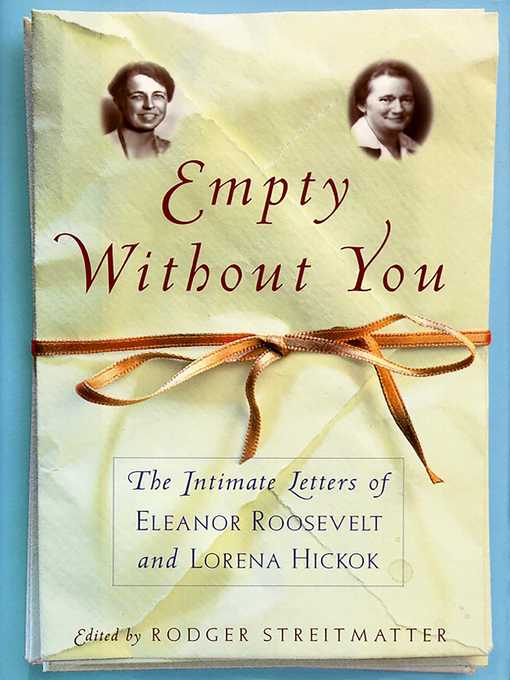
Empty Without You
The Intimate Letters Of Eleanor Roosevelt And Lorena Hickok
کتاب های مرتبط
- اطلاعات
- نقد و بررسی
- دیدگاه کاربران
نقد و بررسی

September 28, 1998
Having fought her way to the top of the news room, AP reporter Lorena Hickok refused to write women's page pieces on Eleanor Roosevelt when she was assigned to cover FDR's campaign for governor of New York in 1928. By the time FDR ran for president, his wife had become one of his most trusted political advisers, and it was inevitable that she and Hickok ("Hick") would meet. Their fascinating correspondence is a testimonial not only to a passionate (and at one time undoubtedly physical) relationship, but to both women's remarkable intelligence and humanity. Eleanor's letters record much: her daily routine; her role as mother; her love for Hick; and her unabashed views on politics, racism, poverty, war and women's roles. Eleanor redefined the role of first lady from model housewife to political adviser and, with Hick's help, she wrote articles and eventually her own syndicated column. For her part, Hick, fearing conflict of interest, gave up her job at AP and took a position in the Roosevelt administration as a relief investigator. But she missed reporting, and the long hours of travel also undermined her confidence in her relationship with Eleanor. The letters speak of botched attempts at privacy, disrupted plans and endless apologies from Eleanor, but their relationship endured, evolving from one of lovers to one of devoted friends. The editorial comments are minimal (mostly constrained to prologue, epilogue and notes highlighting the fairly obvious passages indicating a physical relationship). Still, on its own this collection provides not only a heart-wrenching and personal look at a friendship but also a unique view of a turbulent time in American history.

July 1, 1998
Eleanor Roosevelt defined the role of activist First Lady. Lorena Hickok was the preeminent female journalist of the 1930s and became the top political reporter for the Associated Press. Together they shared a caring, passionate relationship for 30 years. Streitmatter, author of Unspeakable: The Rise of the Gay and Lesbian Press (LJ 11/15/95), here collects 300 of the more than 3500 letters Roosevelt and Hickok wrote to each other from 1933 until Eleanor's death in 1962. These skillfully annotated letters provide an intriguing portrait of two dynamic women devoted to each other, who may or may not have shared a lesbian relationship. The most fascinating letters are Hickok's reports to Eleanor about the human struggles during the Depression that she wrote while serving as chief investigator for the Federal Emergency Relief Administration. Sadly, many of the letters show an unraveling of their relationship, largely caused by Hickok's public rages and mental and physical deterioration. These often enchanting letters illuminate a to-the-death friendship, just as Closest Companion (LJ 4/1/95) does for Franklin Roosevelt and his confidante Margaret Suckley. Recommended for larger public and women's studies collections.--Karl Helicher, Upper Merion Twp. Lib., King of Prussia, PA

September 1, 1998
When the 3,500 letters written by Eleanor Roosevelt and Lorena Hickok over a period of 30 years were discovered by archivists in 1978, they created no small controversy regarding the nature of the relationship between the two women. Although excerpts of the letters have often been quoted, this first-ever collection contains 300 letters in their entirety, allowing for an understanding of the contents within the context of the lives and turbulent world of these two remarkable women. Focusing on the years 1933 through 1935, the correspondence reveals a strong, passionate, and intimate relationship between the dynamic First Lady and her "first friend." Streitmatter intersperses brief narrative and annotations providing historical background and clarification. His comments are helpful, sensitive, and not the least intrusive. The letters themselves offer a fascinating glimpse into the private life of a very public figure. They show, too, that Hickok was also a significant political influence on Mrs. Roosevelt's revolutionary changes to the role of the First Lady. ((Reviewed September 1, 1998))(Reprinted with permission of Booklist, copyright 1998, American Library Association.)

























دیدگاه کاربران